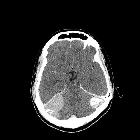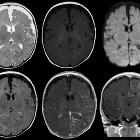neurofibromatosis type 2




























Neurofibromatosis type 2 (NF2) is a rare autosomal dominant neurocutaneous disorder (phakomatosis) manifesting as a development of multiple CNS tumors. Unlike neurofibromatosis type 1 (NF1), it is not associated with neurofibromas. Instead, patients with this disease have:
- intracranial schwannoma(s): mostly vestibular schwannoma(s) sometimes patients may have spinal schwannomas
- intracranial and spinal meningioma(s)
- intraspinal-intramedullary ependymoma(s)
Terminology
These features give rise to the acronym MISME, which describes Multiple Inherited Schwannomas Meningiomas and Ependymomas . In fact, labeling this disorder neurofibromatosis type 2 is a misnomer, because neurofibromas are not a part of its constellation of abnormalities .
Epidemiology
The disease is rare with an estimated prevalence of 1:50,000. NF2 usually presents in young adults (age 18-24 years) .
Of patients with NF2, 50% have an affected parent (autosomal dominant inheritance) and 50% having a de novo mutation .
Pathology
The NF2 gene is located on the long arm of chromosome 22 (22q12) and encodes the merlin protein (also known as "schwannomin"). It plays a role in contact inhibition of growth and has tumor suppressor function at least in part according to this mechanism . Although variably expressed throughout the body during human development, merlin is highly expressed in adult neuronal, Schwann, and meningeal cells. Mutations in NF2 cause loss of protein function, resulting in a predisposition to tumor formation throughout the nervous system .
Although meningiomas are often isolated findings in adults, their presence in a child should raise suspicion regarding NF2. The presence of multiple and different types of spinal tumors also raise a high suspicion of NF2 .
Associations
There can also be associated syringohydromyelia with lesions in the spine as well as cataracts .
Radiographic features
Please refer articles on individual lesions for respective specific imaging features:
- meningioma
- schwannoma
- usually an inferior vestibular division of cranial nerve eight
- can also be from the facial nerve
- ependymoma: usually spinal intramedullary (not intracranial/intraventricular)
Practical points
Bilateral vestibular schwannomas are diagnostic of NF2 but care should be taken because bilateral internal acoustic meatus masses are not specific for vestibular schwannoma and can represent, for example, sarcoid or metastases .
Siehe auch:
- Ependymom
- Neurofibromatose Typ 1
- Schwannom
- Vestibularisschwannom
- neurofibromatosis type 2 (mnemonic)
- Phakomatosen
- Meningeome bei Neurofibromatose Typ 2
- MISME
und weiter:
- neuroradiologisches Curriculum
- Meningeom Nervus opticus
- intradural spinal mass lesions - an approach
- Neurofibromatose
- multiple cauda equina schwannomas in neurofibromatosis type 2
- bilaterales Vestibularisschwannom
- Neurofibromin
- Nervenscheidentumor
- meningioangiomatosis
- neurilemmomatosis
- multiple meningiomas
- multiple intracranial tumours in neurofibromatosis type 2
- Schwannome der Hirnnerven
- intrakraniale Schwannome
- pelvines Neurofibrom

 Assoziationen und Differentialdiagnosen zu Neurofibromatose Typ 2:
Assoziationen und Differentialdiagnosen zu Neurofibromatose Typ 2:




